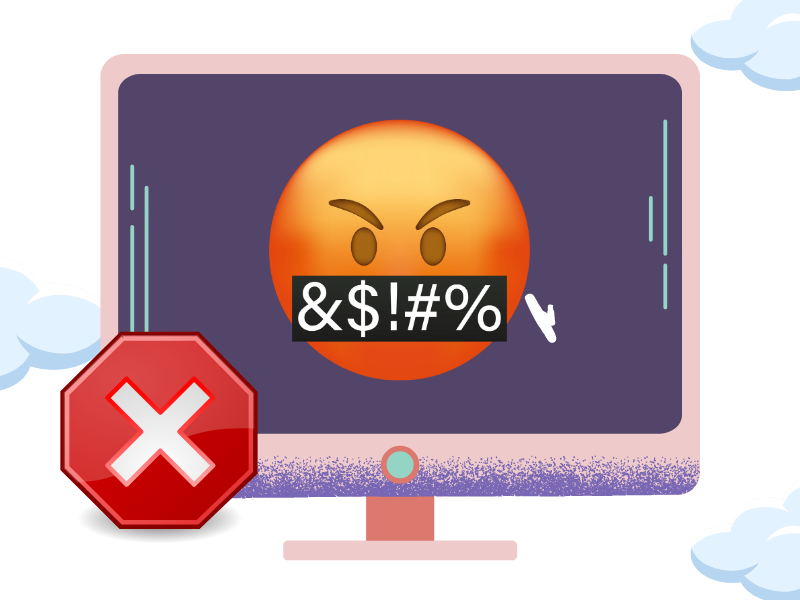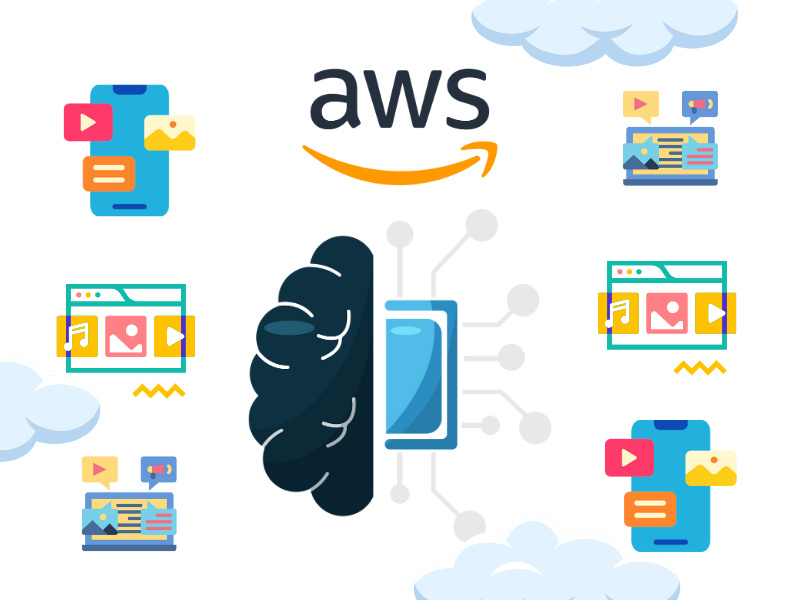Contents
- The Need for Proactive Content Moderation
- About Content Moderation
- Leveraging AI/ML for Content Moderation
- AWS Services for Content Moderation
- Automated Content Moderation Workflow
- Ensuring Accuracy and Quality of Content Moderation
- DeepScan – A Scalable Content Moderation Tool Developed by TrackIt
- Conclusion
- About TrackIt
The Need for Proactive Content Moderation
In an era marked by an unprecedented surge of content, proactive content moderation plays a vital role in ensuring the integrity of a secure and accountable online sphere environment. Recent statistical data from YouTube reveals the staggering magnitude of this phenomenon, with approximately 3.7 million videos being uploaded on a daily basis.
Prominent online platforms are currently confronted with the arduous task of actively monitoring and moderating the overwhelming volume of user-generated content. In light of this challenge, the emergence of Artificial Intelligence (AI) and Machine Learning (ML) technologies opens up substantial opportunities. AI/ML services such as those offered by Amazon Web Services (AWS) offer content platforms with an opportunity to streamline and automate content moderation.
About Content Moderation

Content moderation encompasses the processes and techniques used to review, filter, and control user-generated content. It involves identifying and addressing various forms of inappropriate or harmful content, including hate speech, harassment, violence, and explicit material.
Establishing a proactive content moderation process helps ensure a safe and responsible online environment taking the sensitivities of an audience into consideration. Swiftly identifying and addressing inappropriate content allows content moderators to mitigate potential harm, maintain audience trust, and uphold community guidelines.
Leveraging AI/ML for Content Moderation
Image recognition and computer vision technologies play a pivotal role in content moderation. Leveraging image recognition algorithms allows platforms to automatically analyze and classify images and videos in order to identify potentially harmful content.
It is worth noting that the application of AI/ML models extends beyond visual content. Models can also be trained to analyze audio content to detect inappropriate or harmful speech within media assets.
How AI/ML Models get more effective over time
The efficacy of AI/ML models lies in their ability to learn from vast datasets. These models leverage a broad range of input sources to gradually enhance their proficiency in recognizing intricate patterns, discerning contextual cues, and gauging viewer sentiments.
Through a continuous process of training and improvement, models evolve to deliver increasingly precise identification of objectionable content.
AWS Services for Content Moderation
Amazon Rekognition for image and video analysis
Amazon Rekognition is a powerful AWS service that provides comprehensive image and video analysis capabilities. It employs AI/ML algorithms to detect objects, faces, and explicit visual content. Integrating Amazon Rekognition into a content moderation workflow helps to automate the detection of questionable visual content for removal.
Amazon Transcribe for automatic speech recognition
Amazon Transcribe, an AWS service for automatic speech recognition, enables the conversion of audio files into written text. Transcribe helps automate audio content analysis to identify and flag potentially harmful or inappropriate language.
By combining the capabilities of Amazon Rekognition and Amazon Transcribe, content platforms can create comprehensive AI/ML workflows for streamlined content moderation. These scalable workflows powered by AWS infrastructure enable the analysis of both visual and audio content to ensure a holistic approach that works at scale.
Automated Content Moderation Workflow
Preprocessing
Preprocessing is an essential phase in the content moderation process. It requires careful handling of data before the application of AI/ML models. This preparatory stage involves the following steps:
- Organizing and storing content on AWS to ensure data integrity
- Maintaining stringent data security and privacy protocols
- Establishing robust mechanisms for data storage and retrieval that align with best practices
Configuring Amazon Rekognition and Amazon Transcribe
Proper configuration of Amazon Rekognition and Amazon Transcribe helps establish a robust and customized framework for content analysis and moderation. The content analysis process encompasses the following steps:
- Configuring Amazon Rekognition and Amazon Transcribe to facilitate accurate and efficient analysis
- Setting up appropriate parameters in alignment with content moderation requirements
- Initiating the analysis to begin the evaluation of the content
- Defining specific criteria and thresholds to identify and flag inappropriate content
- Allowing for the customization of moderation workflows based on the defined criteria
Classification, detection, and filtering by AI/ML
When trained on extensive datasets, the configured AI/ML models offer remarkable capabilities in content moderation, including:
- Accurate classification, detection, and filtration of inappropriate or harmful content.
- Consideration of various factors such as text sentiment, contextual understanding, and visual elements to assess the suitability of content for publication.
- Empowering platforms to automate content moderation processes and uphold user safety.
Ensuring Accuracy and Quality of Content Moderation
To ensure accurate content moderation, AI/ML models must be trained and fine-tuned to meet workflow requirements. This process involves providing labeled data for model training, conducting iterative evaluations, and refining models to achieve higher accuracy and precision.
Handling false positives and false negatives in the moderation process
False positives (flagging content as inappropriate when it is not) and false negatives (not flagging inappropriate content) are inherent challenges in content moderation. To minimize these errors, strategies such as adjusting thresholds, leveraging user feedback, and conducting regular audits can be implemented.
Continuous improvement and updating of AI/ML models
Content trends and user behavior evolve over time, requiring AI/ML models to adapt accordingly. Platforms can actively collect and analyze user feedback, monitor emerging content patterns, and continuously update and improve their AI/ML models to address new challenges and maintain effective content moderation.
DeepScan – A Scalable Content Moderation Tool Developed by TrackIt
DeepScan is a ready-to-use web-based application developed by TrackIt for effective content moderation. The solution can be used to automatically identify and flag suggestive content in video and audio files. Items of interest are timecoded and can be exported to popular editing systems for final review. DeepScan helps streamline post-production editing workflows, significantly reducing the time and expense associated with manual content curation.
Conclusion
Artificial Intelligence and Machine Learning technologies offer powerful solutions for content moderation at scale. Leveraging AWS services such as Amazon Rekognition and Amazon Transcribe allows platforms to streamline content curation processes by automating the detection of questionable content.
With careful considerations for accuracy and continuous improvement, AI/ML-based content moderation can help create safer online environments, improve user experiences, and uphold responsible content practices.
About TrackIt
TrackIt is an international AWS cloud consulting, systems integration, and software development firm headquartered in Marina del Rey, CA.
We have built our reputation on helping media companies architect and implement cost-effective, reliable, and scalable Media & Entertainment workflows in the cloud. These include streaming and on-demand video solutions, media asset management, and archiving, incorporating the latest AI technology to build bespoke media solutions tailored to customer requirements.
Cloud-native software development is at the foundation of what we do. We specialize in Application Modernization, Containerization, Infrastructure as Code and event-driven serverless architectures by leveraging the latest AWS services. Along with our Managed Services offerings which provide 24/7 cloud infrastructure maintenance and support, we are able to provide complete solutions for the media industry.

